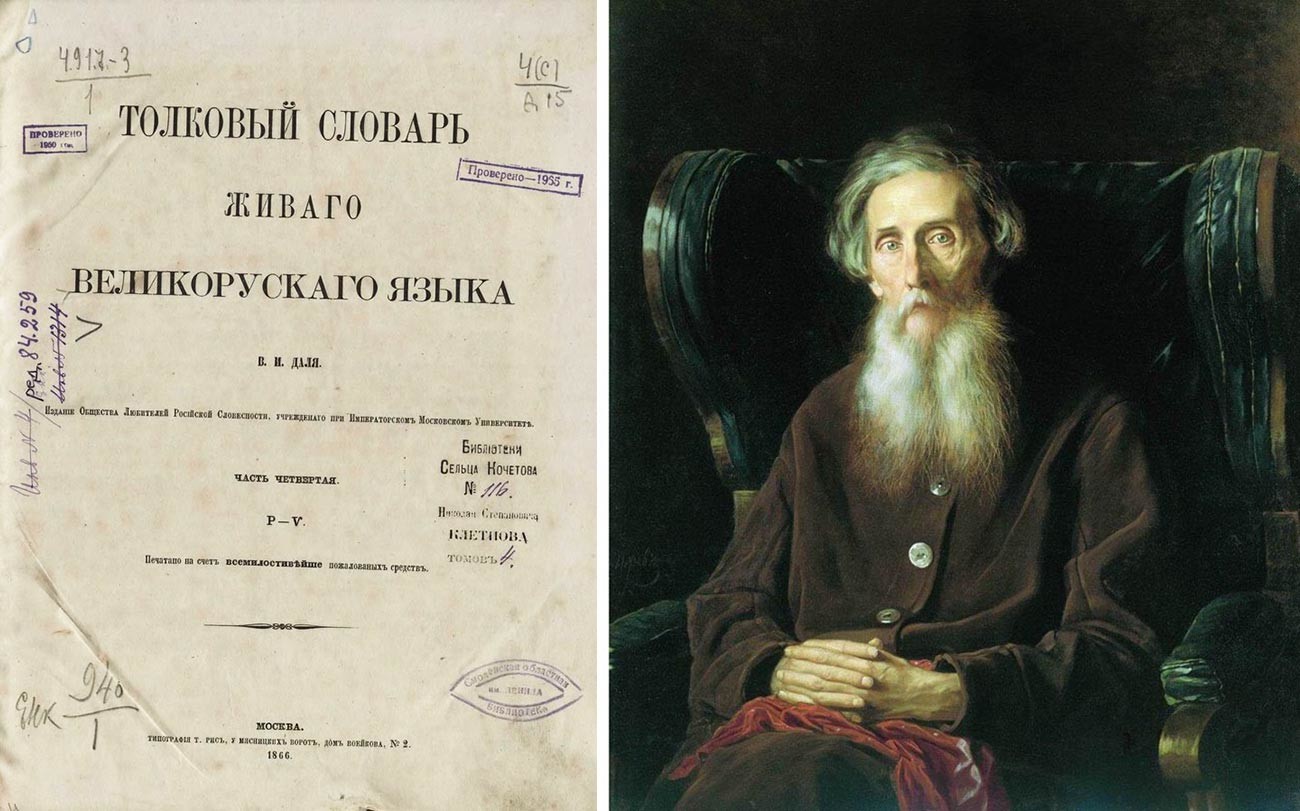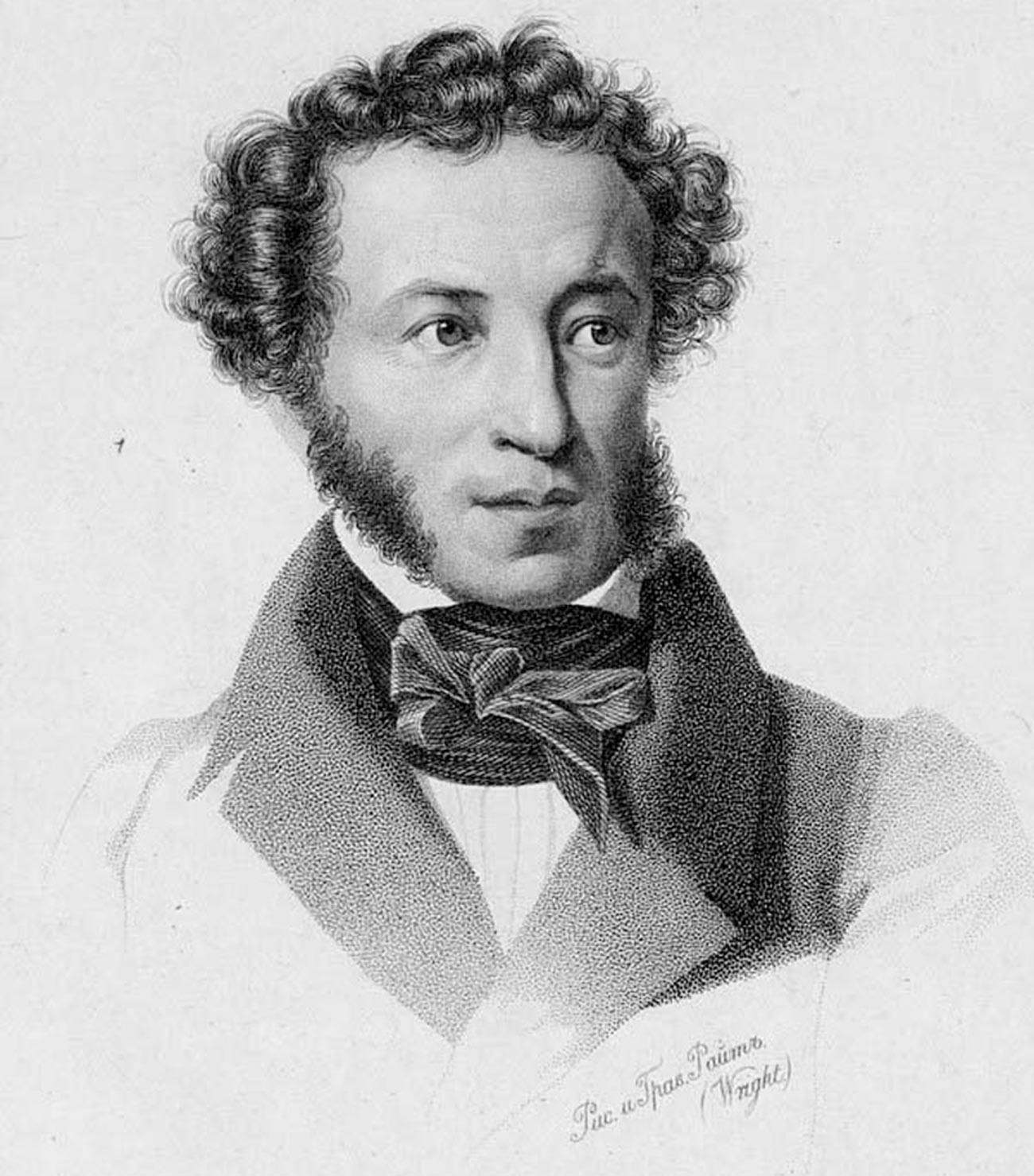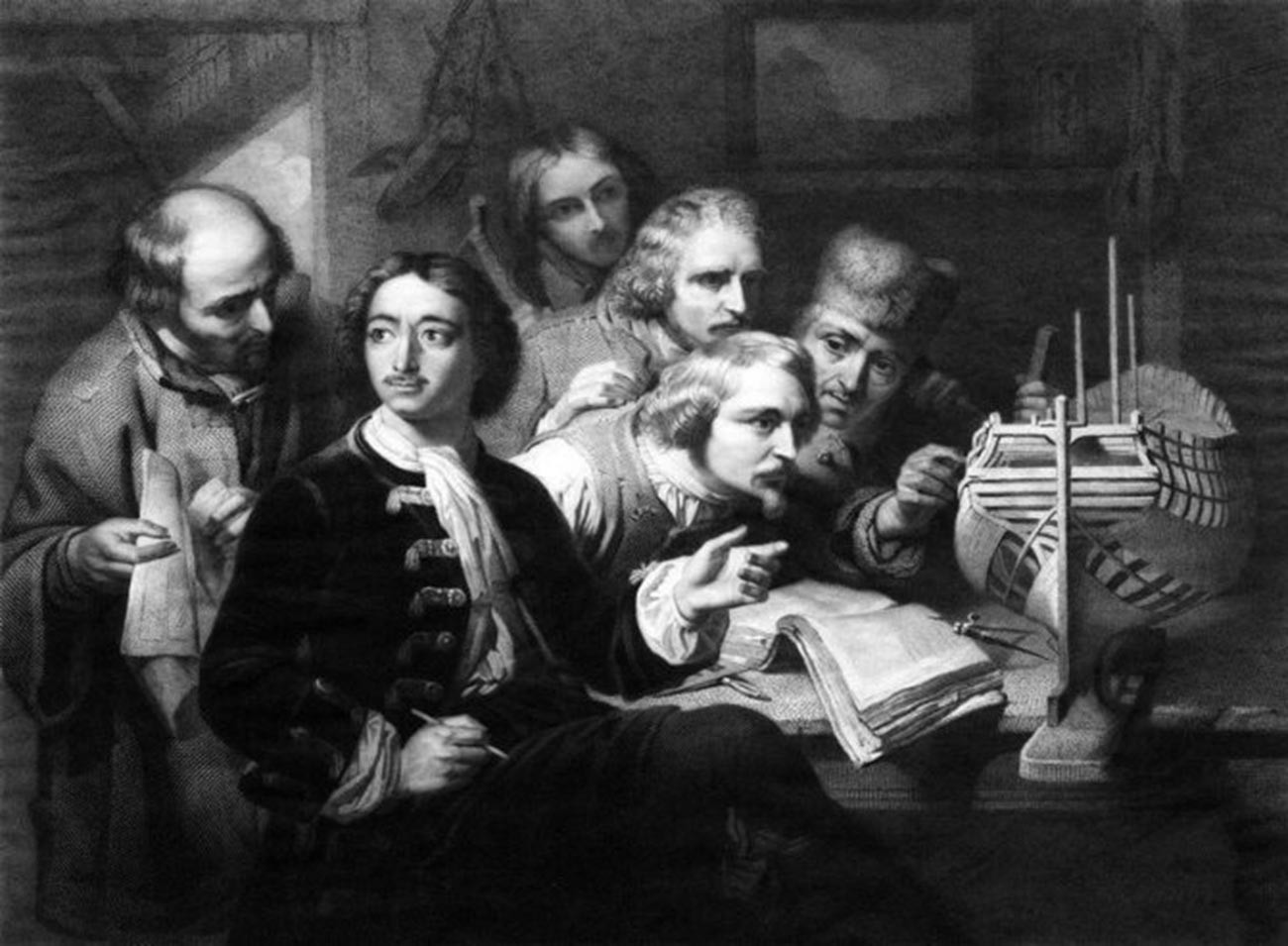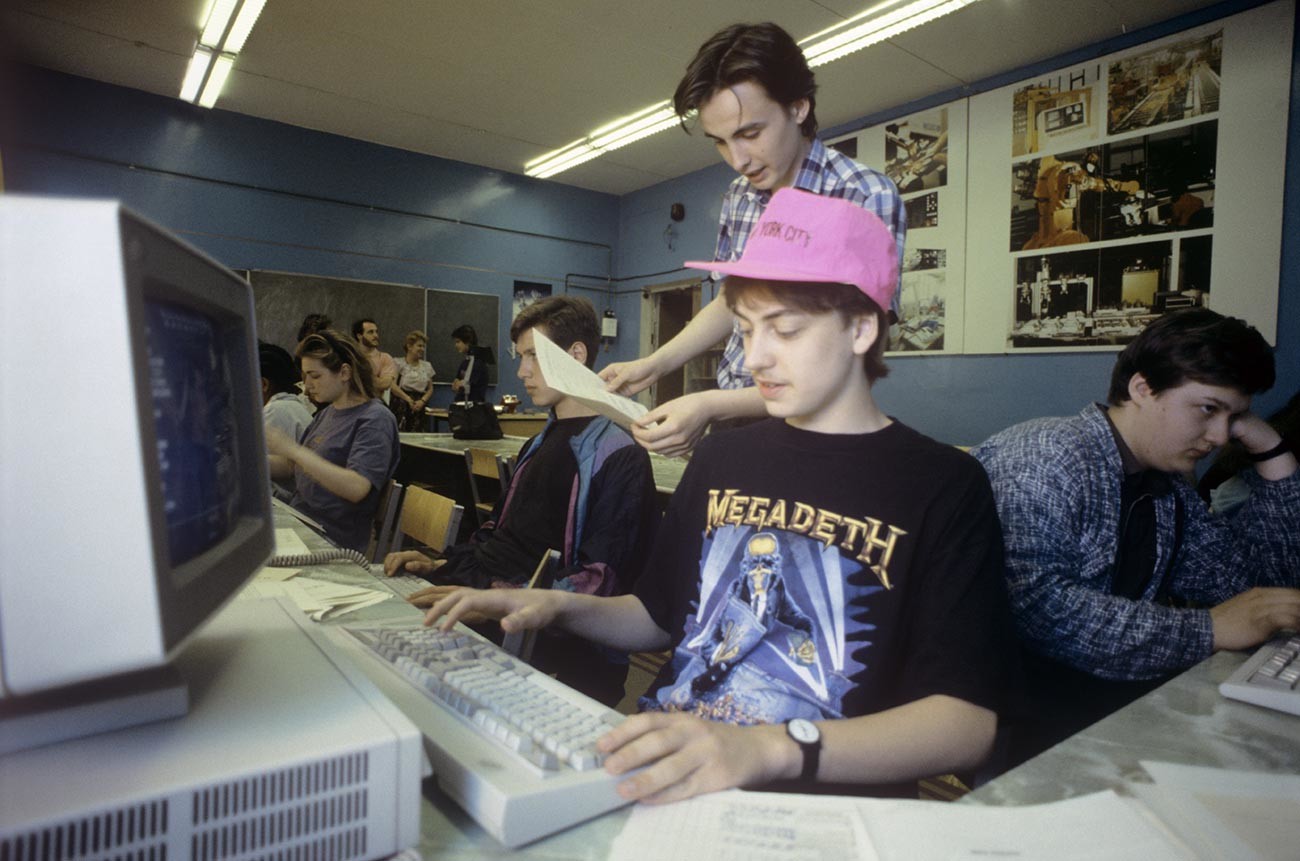A bit of history
The first Russian dictionaries were compiled in the late 18th century. Those were dictionaries of church vocabulary, as well as Academy of Sciences dictionaries, which sought to draw up a map of the origin of all words based on their roots. Those dictionaries consisted of under 50,000 words.
In the 19th century, Vladimir Dal included over 200,000 words in his famous ‘Explanatory Dictionary of the Living Great Russian Language’. Its core was made up of words commonly used in standard Russian. Dal also incorporated Church Slavonic words, which were used only in writing, and became the first scholar to collect a huge amount of colloquialisms, which had not been committed to writing before.
The first ever edition of Vladimir Dal’s ‘Explanatory Dictionary of the Living Great Russian Language’ (1863-1866); Portrait of Vladimir Dal painted by Vasily Perov
Public domain
In the 20th century, several more dictionaries were compiled, with the number of words in them varying from 50,000 to 120,000. There were several editions of them, too, since the authors could not agree on whether words derived from others and having the same root as them should be listed as separate entries. It is generally accepted that there are about 40,000 roots in the Russian language.
What about present-day Russian?
The most up-to-date and authoritative source of information on the vocabulary of modern Russian is the ‘Great Academic Dictionary of the Russian Language’. Its 30 volumes contain about 150,000 words – this is the amount of words believed to be used in standard Russian today.
By way of comparison, the Oxford English Dictionary contains about 400,000 words. However, linguists avoid comparisons like these, because each dictionary is different. For example, the Great Academic Dictionary of the Russian Language contains only modern words, whereas the Oxford English Dictionary lists all words from year 1150, including obsolete and dead ones, as well as words from American and Canadian English.
Also, some lexical items are not listed in dictionaries, for example, adverbs formed from adjectives. That is, the number of actual words is higher than the number of lexical items. In addition, Russian has some 40 words with the root люб-, while English has only about five words with the root “love”.
“If we supplement the 150,000 words of modern standard Russian with, say, dialect words, we will get 400,000 words,” says linguist Lyudmila Kruglikova, one of the authors of the Academic Dictionary.
Are all the words used?
So, does an average Russian use all 150,000 words? Certainly not. It is believed that the average vocabulary of an educated person consists of about 10,000 words, with just some 2,000 of them being in active use. Professionals who use a specialized vocabulary may have about 2,000 more words in their active vocabulary.
One of the record holders in terms of the number of words in their vocabulary was poet Alexander Pushkin. In the mid-20th century, a Dictionary of Pushkin’s Language was published, which had been several decades in development. Having analyzed all of the poet’s works, as well as his letters, business papers and drafts, the compilers included about 21,000 words in the dictionary.
Portrait of Alexander Pushkin
Thomas Wright
It is Pushkin who is widely considered to be the creator of the modern standard Russian language in use today. He introduced into writing colloquial words that had not been used before and lowered the overall register of written Russian, which used to be very high-flown and formal.
How many of these words are ‘borrowed’ from other languages?
The Russian language has absorbed borrowings from many other languages: It adopted Greek words with the spread of Christianity and Turkic with the development of ties with Turkic-speaking neighbors. Under Peter the Great, Russian became enriched with many European words in various areas of science, navigation and other spheres of life.
Peter the Great in Zaandam, Netherlands
J. Michel
In the 19th century, Russian aristocracy adopted French as their second language, so it is not surprising that about 6 percent of Pushkin’s vocabulary was made up by borrowings. Scholars have established that 52 percent of borrowed words in the poet’s vocabulary came from French, about 40 percent from German and only 3.6 percent from English.
‘The Dictionary of Foreign Words’ that was published in the USSR had about 23,000 words in it, while the 2014 ‘Dictionary of Foreign Words in Modern Russian’ already contained 100,000 entries.
In the 20th century, Anglicisms accounted for most of borrowed words in the Russian language, and after the collapse of the Soviet Union, their number grew even bigger. It is believed that more than half of words in modern Russian are borrowings and about 70 percent of them are borrowed from English. Furthermore, the number of borrowed words is constantly on the rise.
Most of the newly borrowed words in 1990s were devoted to technologies and business
Alexei Fedoseev/Sputnik
Linguists point out that new borrowings appear mainly in professional and specialist spheres, but are increasingly becoming part of everyday language. “Foreign words adapt to the system and borrowed roots develop Russian affixes, this is how you get words like постить (derived from ‘to post’), смайлик (from ‘smiley’), океюшки (from ‘okay’), лайкать (from ‘like’) and even облайканный (from ‘like’),” notes Kruglikova.
If using any of Russia Beyond’s content, partly or in full, always provide an active hyperlink to the original material.
Get the week’s best stories straight to your inbox
Have you ever wondered how many words there are in the Russian language? Russian is an old – and constantly evolving – language, so it does contain a high humber of words. But finding out how much exactly can be very tough. After all, with al its declensions, perfective/imperfective verbs and loanwords from English, which words are really Russian? And which words count?
Note: in this article we’re going to find out how many words to learn the Russian language. We’re going to take a look at the common estimates, and how relevant they are. Most of the time the question behind ‘how many words in the Russian language?’ is ‘how many words to learn to speak Russian fluently?’. It’s a very good question if you’re learning Russian. We’ll discuss that and at the end I’ll give you my strategy for quickly and effectively increasing your vocabulary.
How many words are there in the Russian language?
There are many estimates. However, several of the larger Russian dictionaries quote around 130,000 to 150,000. Now, that’s a lot of Russian words. But if you compare it to English for instance – which has more than 400,000, then it’s not that bad. The main reason for that is that Russian doesn’t have to many so-called loanwords included in the dictionaries (yet). English has a lot more of those. But Russia wasn’t exposed to many other languages in the time of communism.
So some of the estimates are around 150,000 – which means there a lot of Russian words to learn.
By the way, if you want to learn Russian quickly, I’ve got a course that teaches you how to use strategic habit-building to make learning Russian fun, easy, and automatic. It’s not free, but it’s helpful if you’re currently struggling with learning Russian. You can find more information here.
That’s a lot – and there are even more
Unfortunately, the truth is there is an even higher number of words in the Russian language. You see, it all depends on how you go and count them. Do you count красивый-красиво as 1 word or 2? And what about all the other forms of the adverb?
On top of that, you have all the perfective and imperfective verbs. Some of them are counted twice (such as идти/ходить). But others were the difference is a simple change of а for an и (получить – получать), they might not be included.
And then of course you’ve got all the loanwords that are entering the language in the last ten years – because of the internet this has gone a lot faster than before. But this is the case in virtually ever language. So Russian words like милкшейк (milkshake) also have to be counted, since they are used pretty often.
On top of that, you also got all the regional dialects, which also contain a lot of Russian words that are not in the dictionaries. And I’m also doubting if some of the creative Russian swearing is counted in all of the estimates.
So if you take all this together, then the estimates take on a whole new form. How many words in the Russian language? Well, including all these, the number of words you’re going to get anything from 250,000 to 500,000.
But the good news is you don’t need to learn them all
That’s a lot of Russian words. if you were to learn 100 words every single day – it would still take you 7 to 15 years to learn all of them.
That’s crazy. But the good thing is that you really don’t need to learn all of them. Think of English, I’m sure every once in a while you come across a word that you don’t know its meaning. Plus there are tens of thousands of other words that you will probably never hear in your lifetime. Or others that are simply not relevant for you – and will never be. Think of all the Russian words that are only used in specific professions. All the lingo that is being used in law, or construction, or accounting, or politics even will most likely never apply to you (unless you work in one of these fields of course).
So the real question is:
How many words to be fluent in Russian?
When we approach the question from this angle – everything becomes a lot more fun. Instead of feeling overwhelmed with such a higher number of words to learn, everything starts feeling very manageable now. My first start with Russian was through the Michel Thomas method – and he always emphasized me that you only need to learn around a 1000 words.
His story was that some study analyzed national newspapers – and to understand around 80% of all the words, you needed to learn around a 1000 Russian words. Now, that was for English – but the same principles apply for Russian. heck for every language. Many of the words that you use in your daily life are going to be the simple words. Now, of course once a while a more difficult word will be used in specific situations – but most of the time you can guess the meaning of those words anyways.
So if you only need to learn around a 1000 words to understand around 80% of Russian, then how much do you need to learn around 90% of words? Well, the answer is maybe 2,000. So if you would learn only 20 words every day – it would take you a 100 days in total to understand virtually all spoken Russian.
Add in some cognates (words that sound the same in several languages – most famous are taxi, tobacco etc.) and your vocabulary most likely already contains a couple of 100 words. So you really shouldn’t worry that much about vocabulary. Sure, you’re not going to know 2000 words in 30 days. But if you take your time and learn a couple of words every day, you’ll find that you’ll come very far in just a couple of months.
What’s the best way to learn new words?
There are many methods out there for learning vocabulary. But the one that I personally like the most is using spaced repetition. It basically means flashcards – but with the added twist that if you get something right, you’ll practice that word again in let’s say 10 days. But if you get it wrong, you’re doing it again tomorrow. It’s like having a stack of 100 flashcards, and if you don’t know a word you put it back in the top 10 cards – and if you do know it you put it on the bottom.
Of course, there’s an app for that! It’s called Ankidroid and it’s free. Plus you can download a lot of other free decks for learning words. I’m going through a deck now which has around 5000 words. And I’m getting 20 new words every day. Needless to say, over the last 9 months tat I’m doing this my vocabulary has skyrocketed!
P.S. How many words in the Russian language? Somewhere between 250,000 and 500,000. But you don’t need them all. Install Ankidroid, download a Russian-English flash card deck and you’ll surprise yourself how fast you’ll know your first 1000 words (which consist of 80% of all regularly-spoken words in Russian). Curious how to learn the grammar that goes along with it? Sign up here for the free trial of Russianpod101!
What should you do next?
Learning Russian does NOT need to be difficult. All you need is a solid plan that helps you improve the following things on a consistent basis:
- Vocabulary
- Grammar
- Listening
- Speaking
That’s ALL you need. If you can do this for a couple of weeks, you’ll already be making great progress in your Russian skills.
And the best part? If you improve a little bit every day, soon these practices will become daily habits.
And then you will start making progress on autopilot.
This means that learning Russian is now a part of your daily routine. So you won’t even need discipline anymore to get yourself to practice.
If you like how this sounds, check out my course the Russian Conversational Blueprint.
It teaches you how to use strategic habit-building to make learning Russian fun, easy, and automatic, so that you can finally start to enjoy conversations with native Russian speakers.
The course is not free, but if you’re serious about learning Russian, it will be incredibly helpful.
How many words are there in Russian? It would seem that the answer is very simple. The 17-volume Big Academic Dictionary contains 131 words.
Let’s try to find out the number of words in English by looking in the dictionary: The second edition of the 20-volume Oxford English Dictionary contains 171 words currently in use, and 476 obsolete words. To this can be added about 47 derivative words.
How many words appear in English?
So how many words are there in English at the moment? According to GLM, English currently has 1 million 4 words. Moreover, according to statistics, a new word in English appears every 910 minutes (98 words per day).
How many words do you need to know in English?
To express yourself truly FREELY, you need to know about 5000-6000 words. This vocabulary corresponds to the Advanced level, and this is already 3-4 years of learning English from scratch.
How many swear words are there in Russian?
In total, 13,5 billion obscene words are spoken in Russia per day, and 156 words are spoken every second.
How many new words are there per day?
Scientists have calculated that an average of 15 new words appear per day, but not all of them take root in the language, but only those that are most widespread.
Which language has the most words?
In June 2010, USA Today published the following data on the number of words in various languages: English — 999 words, Chinese (including dialects) — more than 985 words, Japanese — 500 words, Spanish — 000 words, Russian — 232 words.
How many words do you need to know for the Advanced level?
Advanced is a level that will increase your vocabulary to 4000-6000 words and expressions.
What is the richest language in the world?
Russian is the richest language in the world
How many words do you need to know to speak Russian?
About 8000 words — Provide meaningful communication for the average European. You practically don’t need to know more words in order to communicate freely both orally and in writing, as well as to read literature of any kind. 10-000 words — active vocabulary of an educated European (in their native language).
Why are there more words in English than in Russian?
Myth number 2.
But in fact, there are even more words in English than in Russian. The Oxford Dictionary includes about 600 thousand words, and the Comprehensive Academic Dictionary of the Russian Language — only 131 thousand. So many words in English have appeared thanks to borrowings from other languages, mainly from French and Latin.
How many new words are added per year?
English is one of the most dynamic languages in the world, with new words being enriched every day. The Global Language Monitor estimates that a new word appears every 98 minutes. As a result of such a lexical «flood», the dictionary can grow by 5363 words a year.
How many words do you need to know for a level?
At the B1 level, 3500 words are required actively and another 2500 passively — a total of 6000. At the B2 level, 5000 words are required actively and another 3500 passively — a total of 8500. At the C1 level, 6500 words are required actively and another 4500 passively — a total of 11000. At the C2 level, 8000 are required. words are active and another 6000 are passive — a total of 14000.
What words do you need to learn in English?
Perhaps you have heard about that terrible amount of time in English — the whole 12! To speak this language fluently, you need to learn them all.
…
Verbs
- be — to be;
- have — have;
- do — do;
- get — receive;
- can — be able to;
- feel — to feel;
- live — live;
- love — to love;
How do you know what your English vocabulary is?
The 3 best tests for determining your English vocabulary:
- Test Your Vocab. One of the best tests for measuring vocabulary volume. …
- Puzzle English. Another great test that works the same way — you just need to mark the words you know. …
- Online Test Pad.
Asked
6 years, 8 months ago
Viewed
3k times
When i saw a dictionary that contains almost three million words Bigg English-Russian Dictionary
Make me wonder to really know how many words are there in Russian language !
Is this the largest dictionary in the world ?
did you know any research on Russian words estimation ?
asked Aug 11, 2016 at 10:48
4
It’s difficult to say exactly how many words there are in the Russian language, as Russian is constantly evolving. Also, it depends if you count each conjugation or case ending as a different word.
The Great Academic Dictionary of the Russian Language says that Russian has around 150.000 words. However, if you add all the dialect and slang words, we might reach around 400.000 words.
Now, that’s a lot of words if you want to learn Russian.
Luckily, you do not need to know all of them.
Even native Russian speakers will only use on a daily bases several thousand words. So you as a foreigner can get by with knowing a lot less words.
It’s been estimated that if you know the most common 2000 words, you can have most conversations to live comfortably in Russia. And if you were to learn 5 words per day, that’s about a year worth of effort.
And if you were to learn 10 new words per day, it would be half a year. So in reality, it’s not that difficult to learn Russian.





